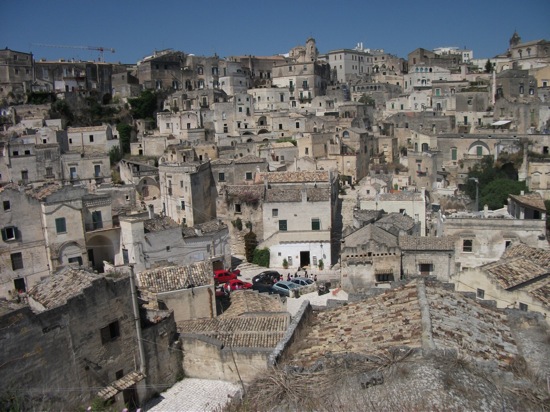
by Mitchell Murdock
(Mitchell Murdock ’14 is in Morse College. This summer, he will be exploring Italy and reporting for the Globalist’s blog on his experiences, from culinary adventures to political events.)
Our tour guide led us through the limestone cave, pointing out 14th Century Byzantine rock paintings and a cistern. The walls disintegrated at my touch, and the cave’s ceiling became the dusty street above. We entered another cave restored with typical ancient décor, complete with wine cellar and moldy matress.
“Yeah, I played in these caves when I was a kid,” our guide said.
No, he didn’t mean he had been a tourist. He is an ancestor of the original cave dwellers.
Mamma mia.

The troglodyte town located in the instep of Italy’s boot is regarded as one of Italy’s first settlements. What makes Matera remarkable is its seamless transition from antiquity: living in the 9,000-year-old house of your ancestors isn’t exactly usual. A phone tower is visible from the caves, and many dwellings have been converted into modern apartments and art galleries. It wasn’t until the 1950s that the Italian government evicted people living in the caves of Matera’s ravine.

Matera, like most of Italy, is a spectacular juxtaposition of modernity and antiquity. Artifacts hundreds of years old are commonplace in day-to-day commotion. Plazas and statues marred with graffiti are less relics of the past as they are proof of urban bustle.
This gritty metropolitan verve is accentuated 250 kilometers west of Matera in Naples, my home base for the summer. Rick Steves and other megatourists, even locals, say that Naples is Italy in the extreme—the best and the worst. This maxim is probably true: despite the mafia’s orchestration of organized crime and the related record levels of trash
in the city, Naples makes a strong case for the world’s best pizza. Like Matera, Naples typifies the pronounced distinction between Italy’s North and South, less touched by the creative flourishing of the Renaissance and more characterized by the daily grind.
And yes, Italians actually say “Mamma mia.”
